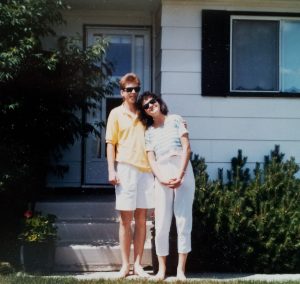
Several of my friends have lost loved ones recently, so I’ve been thinking a lot about death and springtime, and how in some ways it’s a strange combination: nature is shedding its drab greyness and is about to burst into colourful bloom. New life is everywhere. And after the long, cold winter we’ve endured in my part of the world, even die-hard winter lovers (yes, I’m one of those) are looking forward to warmer weather.
But I’ve also been teaching modernist poetry lately, and T.S. Eliot’s famous opening lines of The Waste Land are especially meaningful for people who are grieving at this time of year:
April is the cruellest month, breeding
Lilacs out of the dead land, mixing
Memory and desire, stirring
Dull roots with spring rain.
Winter kept us warm, covering
Earth in forgetful snow, feeding
A little life with dried tubers.
As those “dull roots” are stirred in my memory, I think of the loved ones I’ve lost. My mom died on an Easter Saturday many years ago when I was a teenager. I remember feeling stunned and even offended by the loud celebrations at my church on Easter Sunday. It seemed like a terrible irony that everyone was celebrating the resurrection of Christ when the most important person in my life had just died. (I wish I’d read Megan Devine’s words about “Saturday people” back then.) If I was supposed to feel consoled by my faith, it didn’t work. If you’ve lost someone at Easter, you may also appreciate the stark honesty of this wonderful poem by Jill Alexander Essbaum.
 Not quite two years ago, my brother died. He was the only sibling I grew up with, and I miss him. He won’t see the first snowdrops or share childhood memories with me of splashing in puddles with new rubber boots or building dams with twigs in the forest near our old house. Here’s my favourite picture of the two of us when we were young.
Not quite two years ago, my brother died. He was the only sibling I grew up with, and I miss him. He won’t see the first snowdrops or share childhood memories with me of splashing in puddles with new rubber boots or building dams with twigs in the forest near our old house. Here’s my favourite picture of the two of us when we were young.
I hate platitudes, yet I understand why people say them. Even after experiencing major losses of my own, I’m often unsure what to say to bereaved people. I want to comfort them, not offend them. But the first words that come to mind are often the very platitudes I hate so much: “he’s in a better place” or “she would have wanted you to be happy” or “it’s better to have loved and lost than never to have loved at all.” Fortunately, I haven’t said any of these things aloud; instead, I try to keep my words simple and honest, just, “I’m sorry” or even, “I don’t know what to say.”
My heart aches for the recently bereaved. I know how unreal life seems and how upsetting it is to see the world go on as if nothing happened, as if nobody notices or cares that you’ve lost someone you loved. I know that longing for one last hug, one last conversation, even one last dream in which that person is as vivid and real as he was in life.
I also know the gradual change that happens if I let myself grieve naturally and don’t block the feelings. The way my calmer spirit slowly returns. The guilty feeling that immediately follows the first time I laugh. The shock that comes the first time I forget, even just for a few minutes, that my loved one is gone. And the longing that quickly returns.
Then, months or years later, I realize I haven’t thought about that person for days, maybe even weeks. The shock and guilt return, but they go away faster. And then I’m like everyone else again, no longer crying in public or struggling to complete even the most mundane tasks, but instead noticing small joys such as a cardinal eating seeds in the garden.
I know becoming “normal” is necessary, though I’ll never call it “getting over” the person’s death (another phrase I hate). What I gain in normalcy, though, I lose in closeness to the person I loved. In the depths of the deepest grief, I feel close to him. When I move into later phases of grief and manage to enjoy life again, our relationship becomes similar to that of old friends who’ve drifted apart, waving from afar every so often, but having accepted that we’ll never talk again in the familiar old way. C.S. Lewis writes about a similar experience of separation after his wife died:
Already, less than a month after her death, I can feel the slow, insidious beginning of a process that will make the H. I think of into a more and more imaginary woman. Founded on fact, no doubt. I shall put in nothing fictitious (or I hope I shan’t). But won’t the composition inevitably become more and more my own? The reality is no longer there to check me, to pull me up short, as the real H. so often did, so unexpectedly, by being so thoroughly herself and not me. (A Grief Observed)
I’d like to share some things that have helped me in the early stages of bereavement:
1. Allowing myself to be selfish in the sense of doing what I need to do to heal without worrying about the reactions of others. Remembering my loved one in ways that are meaningful to me and honouring to our relationship.
2. Understanding that people want to help but often don’t know how. Instead of waiting for them to read my mind, I’ve given them lists of things I needed (e.g. food, road trips, phone calls). I’ve also reminded myself that people will say thoughtless things: my loved one is in my mind always, but not in theirs. It’s pointless to hold an offhand remark against them.
If you know a recently-bereaved person, here are some suggestions:
1. Ask what you can do to help, and really mean it. If the person isn’t sure, give him or her a short list of things you’re willing to do.
2. Don’t assume you know what the person needs. Every bereaved person is different. They don’t all want to talk. They don’t all want hugs, especially from people they don’t know well. They don’t all cry in front of others or even look sad. That doesn’t mean they’re not.
3. Time slows to a crawl for most bereaved people in the early stages of grief. A day can feel as long as a year. If the person calls or texts you, call or text back immediately if you can.
Does anyone have additional tips? If so, please add them in the comments or send them to me privately. I’d also like to compile a list of books on bereavement that people have found particularly helpful, so please send me your recommendations. I’ll post the titles here later.
For those who find this time of year difficult, I want you to know you’re not alone.
Lovely post, not one word wasted, every word important.
I remember seeing a newspaper delivered the day after my mom died and thinking how odd it was that for everyone else, it was just a normal day. Or that is how it seemed.
Something I try to remember when there’s been a death is to continue to remember the survivors a month, two months, four months, eight months down the line. Especially between two and three months after the death, when reality really sinks in, when the survivor knows – knows! – that their loved one is never coming back. That’s usually about the time most people think the survivor has “gotten over it” – or that they should have by then – when in fact it is one of the most painful times.
I try also to call or send a little note to the survivor on the 1st anniversary of the death. Something simple, like “thinking of you today and wondering what Bob would have had to say about that Bears game”.
I’ll be coming back to this post and also watching the comments closely. Thank you.
Marilyn, thank you so much for these excellent suggestions. Remembering the survivors throughout the year, not just immediately after their loved one’s death, is so important. At one point I started writing the “death anniversary” dates for loved ones of people I knew on my calendar, but I haven’t been consistent with this and need to be. When people remember and mention these dates in the way you’ve suggested, it can help survivors feel less alone. Thanks again!
Not only less alone, but that their loved one isn’t forgotten, which is a big fear.
So many people have told me how helpful it is to simply hear another person call the deceased by name in casual conversation. Simply to make mention of them. Again, indicates that they have not been forgotten.
Oh, yes! Good point. If people never mention the deceased loved one it can seem as if that person never existed. It’s such a misconception to think that mentioning the name of the deceased will “upset” the survivor: on the contrary, it’s comforting.
A wonderful, moving post. I’m so sorry to hear about your mom’s loss at Easter time and your brother’s more recent. It must be a difficult time of year for you. May their memories be eternal. And may you have health and strength to remember and honour them.
I think that once a person experiences loss, grieving becomes part of our identity: not, at least to me, that it means we always think of that person, or that we cry all the time over her. I think there’s mourning, which follows what we do with a recent loss. And grieving, which I think we do for a lifetime. Mourning is a dark night of the soul and a readjustment to life without that person. Grieving, on the other hand, is very much like Eliot’s poem: mixing memory and desire, loss but also just memories of the deceased, good ones, bad ones sometimes too. It’s bittersweet and somehow less predictable: there may be laughter, there may be tears, there may be both.
I think remembering anniversaries is very important, helping the bereaved find a comforting ritual, in a faith or outside of it, and repeating that event, with the bereaved, might be a comfort. So, if there’s a favourite place, or walk, restaurant, or book, offering to go there with her, or to read the book together. It brings the lost one back, it resurrects her in some fashion. Death is the “undiscovered country” after all, we can’t share it with our loved ones, but we can commemorate.
Miss Bates, thanks for your thoughtful reply. I love the distinction you make between mourning and grieving. Both laughter and tears with grieving—yes, so true! And joining the survivor in a meaningful ritual is a wonderful idea.
Megan Devine, a therapist and grief writer, sent me this article on 11 things you can do to help a grieving friend:
http://www.huffingtonpost.com/megan-devine/death-and-dying_b_4329830.html
I’ve just read a blog post so filled with truth that I had to add a link to it here. It will be especially helpful for bereaved people who are sick of platitudes and insensitive comments and wonder if they’re going crazy.
https://meanfatoldbat.blogspot.ca/2016/06/six-months-in-things-i-have-learned.html?showComment=1465844861532#c4096449651462421664